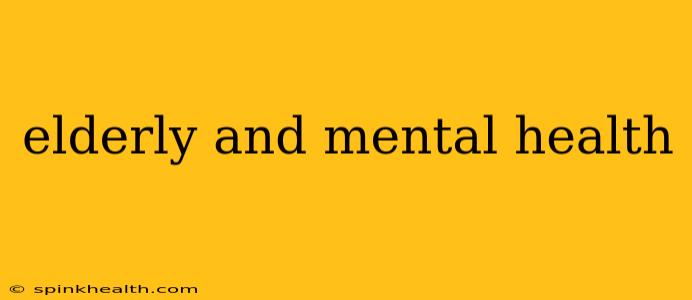The silver years, often envisioned as a time of peaceful reflection, can sometimes be shadowed by the complexities of mental health. It's a topic often overlooked, shrouded in misconceptions and a reluctance to discuss the emotional struggles faced by our aging loved ones. But understanding mental health in the elderly is crucial, not just for their well-being, but for the well-being of families and caregivers too. This isn't just about statistics; it's about recognizing the human experience, the silent battles fought, and the pathways to support and healing.
What are the Common Mental Health Challenges Faced by Older Adults?
This isn't a simple question, as the tapestry of mental health is woven with many threads. Depression, often manifesting as fatigue, loss of interest, and sleep disturbances, is a significant concern. Anxiety, too, can grip the elderly, stemming from physical decline, loss of loved ones, or fear of the unknown. Dementia, encompassing conditions like Alzheimer's disease, presents unique challenges, impacting memory, cognition, and overall personality. Then there are less talked about conditions like delirium, a state of acute confusion, and bipolar disorder, which can emerge later in life. Each condition has its own unique presentation, making early identification crucial.
How Do Mental Health Issues Differ in Older Adults Compared to Younger People?
The experience of mental illness in older adults is markedly different from its manifestation in younger individuals. Physical health conditions often intertwine with mental health, creating a complex interplay of symptoms. Medications, too, can contribute to cognitive changes or exacerbate existing mental health issues. Furthermore, societal expectations and the stigma surrounding mental health can be amplified in older generations, making them less likely to seek help. They may also be more hesitant to discuss their struggles due to deeply ingrained cultural norms.
What are the Risk Factors for Mental Health Problems in Older People?
Several factors increase the risk of mental health problems in older adults. Chronic illnesses like heart disease or diabetes are often associated with depression and anxiety. Social isolation and loneliness, particularly after the loss of a spouse or friends, can significantly impact mental well-being. Financial strain and experiencing significant life changes can also act as significant triggers. Furthermore, access to adequate mental health care can be limited in some communities, exacerbating the problem. It’s a complex interplay of biological, psychological, and social factors.
How Can Family and Friends Support Older Adults Experiencing Mental Health Issues?
Supporting an elderly loved one facing mental health challenges requires patience, understanding, and a compassionate approach. Active listening, providing a safe space for them to express their feelings without judgment, and encouraging them to seek professional help are paramount. Maintaining regular contact, even simple phone calls, can combat loneliness. Helping them manage daily tasks, if needed, can reduce stress. Remember, supporting them doesn’t mean fixing their problems; it means being present and offering unwavering support.
What are the Treatment Options Available for Mental Health Problems in Older Adults?
Treatment options vary depending on the specific mental health condition. Psychotherapy, particularly cognitive behavioral therapy (CBT), can be highly effective in addressing depression, anxiety, and other mood disorders. Medication may also be necessary in some cases, carefully considering potential interactions with other medications. Support groups can provide a sense of community and shared experience. For conditions like dementia, specialized care and support services are crucial. It's essential to work closely with a healthcare professional to develop a personalized treatment plan.
How Can I Help an Elderly Person Who Is Reluctant to Seek Help for Mental Health Concerns?
This is a common and challenging scenario. Gentle persuasion, emphasizing the benefits of professional support, is key. Sharing stories of others who have benefited from treatment can be helpful. Focus on the positive aspects of seeking help, such as regaining a sense of control and improving quality of life. Offering to accompany them to appointments can ease anxieties. Ultimately, respecting their autonomy while gently encouraging them towards professional help is the most compassionate approach.
Understanding and addressing mental health in the elderly requires a multifaceted approach—one that embraces compassion, education, and a commitment to breaking the stigma surrounding mental health in later life. It's a journey of empathy, understanding, and fostering a society where age doesn't diminish the importance of mental well-being.

